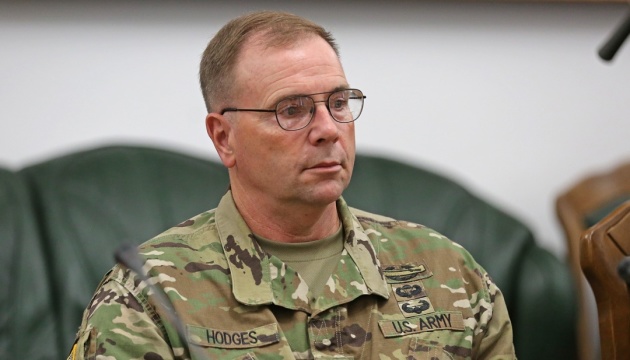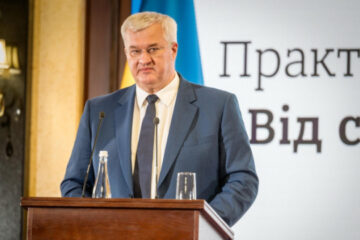Despite intense fighting in certain sectors of the front in Ukraine, the Russian army has not demonstrated the capability for an operational breakthrough. Nevertheless, the West must increase its support for Ukraine by providing long-range missiles and helping to prevent Russia’s large-scale airstrikes against peaceful Ukrainian cities. Retired Lieutenant General Ben Hodges, former commander of the U.S. Army in Europe, spoke in an exclusive interview with Ukrinform about these and other topics, including possible scenarios for ending the war in Ukraine.
SANCTIONS ON RUSSIA MUST BE TIGHTENED TO CLOSE LOOPHOLES
– U.S. President Donald Trump last week announced a 50-day ultimatum to Russia, essentially threatening it with a tougher economic blockade. At the same time, in your recent interview, you said that not all available tools have been used yet to cripple Russia. In your opinion, what specific economic restrictions should the U.S. apply after the ultimatum expires to force Russia to peace?
– Well, first of all, I have to say, I don’t know why the President gave 50 more days. I mean, the Russians don’t need 50 more days to think about what they’re going to do. They’ve had years, and they’ve even had six months under this President. But that’s neither here nor there.
I think the kinds of things that we in the West should be doing include, number one, closing all the loopholes in the sanctions that are already in place. There are too many companies, including American ones, that are finding ways around the sanctions and still doing business. You still have German cars going to Russia. You’ve got parts that are going through India and ending up in Russia that they use for their drones and other weapons. So we’ve got to close the loopholes that are allowing Russia to prosecute the war still.
The second thing, of course, is to disrupt Russia’s ability to export oil to India and China – 70% of their exports go to those two countries. And so I think there are things that we could do legally in the Baltic Sea and the Black Sea that would cause problems for these illegal shadow fleet vessels, having to do with insurance or safety, or environmental compliance, etc.
Third, of course, giving Ukraine the ability to attack Russia’s oil and gas infrastructure, further disrupting their ability to export oil.
And then finally, the frozen assets. We should quit goofing around and use those frozen assets to help pay for Ukrainian reconstruction as well as things that Ukraine needs.

I DON’T SEE IT HAPPENING ANYTIME SOON THAT RUSSIA CAN BREAK THROUGH UKRAINE’S DEFENSES
– Let’s talk about the military support. With the recent U.S.-NATO agreement on coordinated military support for Ukraine, is it accurate to say the U.S. and Europe are in the process of shifting their traditional roles in addressing the Russian invasion? How could this dynamic influence the war’s future trajectory?
– Well, it does seem that this administration is following through on what it said it would do, which is to shift more of the responsibility for supporting Ukraine and for deterrence in Europe against Russia to our European allies and partners, plus Canada and the UK. And that’s not wrong.
The problem is that if we, the U.S., turn our back on Europe, or if we show less interest, if we don’t lead in Europe, then I think we lose a lot in the ability to protect and grow our own strategic interests across Europe. I mean, America’s business depends on stable, secure Europe. The access that European countries give us, with bases in the UK, Spain, Italy, Greece, Türkiye, Germany, Poland, and on and on – that helps us. And I worry that if we turn away from all that too much, it’s going to damage us in the long run.
And then finally, Russia cannot defeat Ukraine, it seems to me. After 11 and a half years, they have been unable to do more than where they are right now, which is about 19% of Ukrainian territory. The Russian Air Force and the Russian Black Sea Fleet are not factors. All the Russians can really do is attack innocent Ukrainian civilians every night with drones. So I don’t see it happening anytime soon that Russia can overwhelm or break through Ukraine, but at the same time, I don’t see Ukraine having the ability to push Russia out either, unless we make that a priority and then provide what’s needed.
– Last week, we witnessed the visit of U.S. Special Envoy Keith Kellogg to Ukraine. How significant could his firsthand assessment be in shaping future American actions in this context?
– Well, it’s hard to say. He is the U.S. President’s Special Envoy to Ukraine. He and his daughter, you know, they were able to hear and see firsthand these attacks against civilian infrastructure. And General Kellogg – while I may not agree with him on everything – is a man of honor and also a retired Army officer, and he knows attacking civilian targets is absolutely against the law. It’s illegal. And so I would hope that he would be able to convey that back to the White House and Congress, that the United States should be doing more to help Ukraine protect innocent people. And then, of course, I think General Kellogg can probably convey to the White House an accurate assessment of the state of the war. This idea that Ukraine doesn’t have any cards, you know… I think General Kellogg understands the nature of war, why people fight. And it’s not who’s got the most stuff, but who has the most heart and determination.
WE MUST KILL THE ARCHER INSTEAD OF TRYING TO INTERCEPT ALL THE ARROWS
– You’ve mentioned air attacks. Russia has intensified and refined its air strike tactics against Ukraine, concentrating more firepower on narrow targets to breach defenses. How do you think what practical steps could be effective to mitigate the impact of these attacks, especially on civilian areas?
– Well, I’m a big believer in the idea of killing the archer instead of trying to intercept all the arrows. So, you know, Patriot is fine, but that’s not going to do anything to help against drones. It’s not going to do anything to help against live bombs. So you’ve got to figure out how to help Ukraine protect civilians against these hundreds of drones every night.
Part of it is, of course, kinetic or nonkinetic means, but really we need to kill the architecture. Where do these things come from? Where are the factories where the Russians are manufacturing these drones? I would target every one of those. We should be giving Ukraine what they need to target every one of these factories to reduce Russia’s ability to keep producing drones on such a scale. To me, that’s a very practical thing that could be done. I imagine that we’re going to see Ukrainian special forces, and GUR continuing to go deep inside Russia to conduct operations to disrupt this long-range precision strike capability against drones, against the headquarters, against the logistics. I think it is something that we can and should be doing.
– Ukraine implemented Operation Spiderweb on June 1, destroying Russian strategic planes. This process was sophisticated and took 18 months of preparation. In your opinion, should the West help Ukraine to provide such an operation to target, as you say, the archer?
– I think that the best thing the U.S. can do in this regard, sharing intelligence, of course, is always helpful. Although I think Ukraine probably has a pretty good sense of where things are inside Russia. This long-range precision capability is something that I think we could do. Germany has offered to do this as well – to invest in Ukraine’s defense industry as it grows its own capacity for long-range precision strike. But we should also be pushing to them, whether it’s Storm Shadow, Scout, TAURUS, ATACMS, and other weapons that are out there. Provide those to Ukraine so that they can attack headquarters, logistics, and the bases from which drones and missiles are being launched. These are the kind of things that we ought to be doing.

THE THREAT POSED BY UNMANNED SYSTEMS
– Given the expanded use of both battlefield and long-range drones in the war in Ukraine, do you view Unmanned Systems as an urgent concern for NATO countries as well? Do they learn from the Ukrainian experience?
– 100%. We are watching all of the things that Ukrainians are doing, not so sure that we’re learning all of it. I mean – I think we still have not grasped the scale and the intensity of what Ukraine is facing from Russia, and that we have to prepare for that. This is not about individual drones dropping a grenade. This is about filling the sky with drones and counter-drone capability. This is what I hope that we are learning.
I know that commanders of the U.S. Army Europe and across the Department of Defense and in most of our allies are looking at this. But I think there’s still a little bit of disconnect from the scale, the intensity, and the speed with which Russia and Ukraine are both doing things. And I don’t know that we have really embraced that yet.
– So, what should NATO do to enhance collective drone defense?
– Well, you know, of course, all of our bases, the airports and seaports, are vulnerable to a Russian “Spiderweb” also. You can’t protect everything. So you have to make sure you can at least protect the most important thing. So I would imagine, I would certainly hope, that the nations and certain ministries are strengthening their ability to protect critical infrastructure, for example, from a spider’s web type attack being launched by the Russians, the Chinese, or somebody else. But this is where intelligence really becomes important.
I mean, the fact that the SBU got so deep inside Russia points to the corruption and the incompetence inside much of Russia, and where Russia’s vastness, which had always been part of its defense security during previous invasions, now is a vulnerability.
I think that our intelligence capabilities should be enhanced to identify when somebody is attempting something like this. And this might also mean, of course, more rigorous examination of containers that come into city ports, for example. None of this is going to be cheap or easy, but the price of a catastrophic failure is too much for us. And so I think we need to make sure, and also that our potential adversaries that might be thinking about doing this, they need to know that the retaliation will be devastating, much more than whatever they might think they might achieve.
STRATEGICALLY, THE RUSSIANS ARE IN A VULNERABLE POSITION
– Let’s talk about the situation on the battlefield in Ukraine. How could you describe the recent development there?
– Well, of course, if you’re a soldier on the ground and these places where the Russians are really increasing the intensity of their attacks and trying to overwhelm in villages, it’s awful. But if you can step back from that and look at the big picture, the operational level of the war, then it’s like, okay. Yes, it’s intensive in these places, but Russia is not really breaking through anywhere; they may capture a village or something, but they’re losing hundreds of people for every square kilometer that they do finally capture. And I think that Ukraine has done a good job of making this very, very costly for the Russians. And I’m seeing reports of second and third lines, so that the Ukrainians are building more depth in their defenses. I think that if Ukraine had the longer-range capabilities to destroy headquarters, logistics, and the artillery that supports these Russian attacks, that would be very effective.
I spoke with a friend of mine recently, who is a senior Ukrainian officer. I would tell you that, of course, he doesn’t speak for everybody, but they seem very confident. Yes, it sucks. Yes, it’s tough. Yes, they’re having casualties, but they still seem confident. And they understand what the price of failure is, you know, with Russia taking over more of Ukraine.
I think the Russians actually are the ones who are in more trouble. If you can think strategically, they’re in a vulnerable position. Their economy is propped up. It doesn’t seem to be an economy that can keep going like it is, especially if we decide to do the economic things we talked about earlier. However, that would require the U.S. president to be much more effective at putting pressure on Russia, and so far, he has not been.
– You mentioned significant casualties of the Russians on the ground. They can carry out so-called “meat assaults” and lose up to a thousand people daily. Now, Russia is lacking trained military personnel. Does it push the Kremlin to announce general mobilization, and what would be the possible outcomes if this were to occur?
– I think that the Kremlin is going to do everything it can to avoid having to do a large-scale mobilization. I know it would be very unpopular. I think instead, they will continue to offer huge bonuses and monetary incentives for people to join the army, which, by the way, is having an impact on the workforce and factories that are no longer there.
I think North Korea is supposed to be sending another 30,000 troops at some point. And this is concerning, because 30,000, that’s not an inconsequential number, and these North Koreans, as I’ve heard, are showing up a little bit better prepared than the first group was. So we’ll see if that makes a difference somewhere. However, I think the Kremlin will do everything it can to avoid general mobilization, especially in Moscow or St. Petersburg.

SCENARIOS FOR ENDING THE WAR
– Given all of this, the international situation, and the development on the ground, what plausible scenarios do you see for the end of the war in Ukraine?
– So I think there’s probably three or four scenarios, or some variations of them. The first is, of course, the worst one, which is the total collapse in Ukraine, for whatever reason, including a lack of political willpower. It seems very unlikely, but let’s say if people finally got tired, and Russia was somehow able to break their will, and Europe, the United States, and Canada just quit. So now you’ve got a case where not only will Russia absorb thousands of Ukrainian troops that will be forced into the Russian army, but then pretty soon, they will begin preparations to go into Moldova, or maybe even into a NATO country like Latvia. So that’s the worst outcome.
The best-case scenario is that the West really gets energized. The United States gets energized, and we realize and act as if Ukraine defeating Russia is in our best interest. Not because of charity for Ukraine, but it’s in our best interest that would help our economy, that would restore the flow of food and energy, which affects prices in the West, and it would also send a powerful signal of deterrence to China, that we do have the will and the capability to do these things. And then, with Ukraine being in a very strong position, Russia is living inside its borders.
Probably the middle sort of scenario is something in between, where, a year from now, the grand probably looks a lot like it does right now, not that much different, unless some really significant changes externally. It’s hard to imagine it being really different anywhere else, but I hope it is. You know, maybe Russia’s economy totally collapses, something happens to Putin… But you can’t make a plan hoping that something like that happens.
I kind of envision that Ukraine is going to adopt an Israeli-style approach, that until they are in NATO, they have to make themselves absolutely indigestible to Russia, and that they’re in a constant state of war. That doesn’t mean there’s fighting every day, but they are constantly vigilant and dealing with incoming Russian drones and rockets the way the Israelis have to do with Hezbollah. And they continue to grow their defense industry the way the Israelis have, and they have regional affiliations that help protect their flanks, for example, help them on the Black Sea.
And then finally, I imagine that GUR is going to be like the Mossad. And every senior Russian officer who has ever had anything to do with killing or attacking innocent Ukrainians or any other war crimes, for the rest of their life, is going to be checking under his car and looking over his shoulder, knowing that GUR is out there waiting for them.
I think that’s probably the most likely outcome, but I really wish we would wise up. It is in our advantage that Ukraine becomes a member of NATO. The sooner, the better.
Yaroslav Dovgopol, Washington
First photo: Ministry of Defense of Ukraine
Source: Ben Hodges, former Commanding General of U.S. Army in Europe




